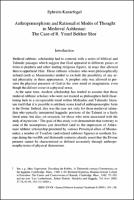Please use this identifier to cite or link to this item:
https://hdl.handle.net/20.500.12202/8533| Title: | Anthropomorphism and rationalist modes of thought in medieval Ashkenaz: The case R. Yosef Bekhor Shor |
| Authors: | Kanarfogel, Ephraim 0000-0002-7539-7802 |
| Keywords: | rabbinic literature Medieval Jewish history |
| Issue Date: | 2009 |
| Publisher: | Stuttgart : Deutsche Verlags-Anstalt, c2002- |
| Citation: | Kanarfogel, E. (2009). Anthropomorphism and rationalist modes of thought in medieval Ashkenaz: The case R. Yosef Bekhor Shor. Simon Dubnow Institute Yearbook, 8, 119-128. |
| Series/Report no.: | Jahrbuch des Simon-Dubnow-Instituts = Simon Dubnow Institute yearbook.;8 |
| Abstract: | Medieval rabbinic scholarship had to contend with a series of biblical and Talmudic passages which suggest that God appeared in different guises or forms to prophets and other leading religious figures, in ways that allowed them to apprehend Him. Those rabbinic scholars who were philosophically inclined (such as Maimonides) tended to exclude the possibility of any actual physicality in these appearances. A prophet only was allowed to perceive the physical presence of God in his own mind or imagination, even though this did not occur in a physical sense. |
| Description: | Scholarly article |
| URI: | https://hdl.handle.net/20.500.12202/8533 |
| ISSN: | ISSN 2197-3458 (Online) ; ISSN 2198-3097 (Print) |
| Appears in Collections: | Bernard Revel Graduate School of Jewish Studies (BRGS): Faculty Publications |
Files in This Item:
| File | Description | Size | Format | |
|---|---|---|---|---|
| Ephraim_Kanarfogel_Anthropomorphism_and Rationalist 119-128.pdf | 2.21 MB | Adobe PDF |  View/Open |
This item is licensed under a Creative Commons License

